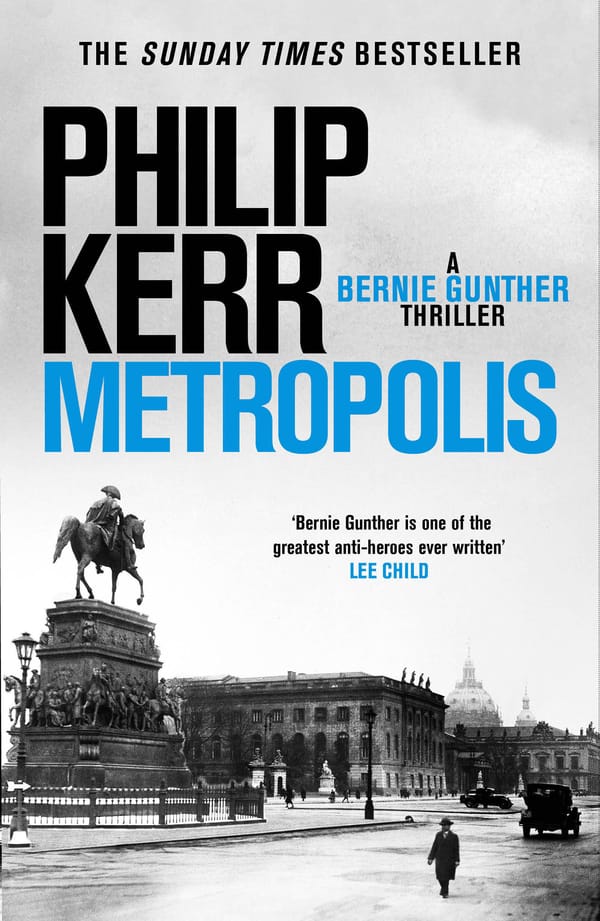METROPOLIS by Philip Kerr (Quercus, $A32.99)

Metropolis by Philip Kerr
As others have noted, reading the late Philip Kerr’s final instalment of his Bernie Gunther magnum opus, Metropolis is a bitter sweet experience.
Since Gunther’s first appearance on the criminal stage in Kerr’s March Violets in 1989, he has become an illustrious member of the world’s fictional detectives and each new volume in his adventures has been eagerly awaited by a growing number of readers. Kerr’s original trilogy of Gunther novels took us from around 1936 and the Berlin Olympics to the end of World War II. Since then he has charted Gunther’s adventures after World War II from Cuba to France to Greece in last year’s Greeks Bearing Gifts, as well as taking readers back to various episodes in his life during the Nazi period as a private eye and a police detective. It has been a marvellous journey.
Now with his fourteenth and final Gunther novel, Kerr takes us back to where it all began in 1928, with Gunther being transferred from the vice squad to the elite Murder Commission of the Berlin police force under the watchful eye of the Chief of the Berlin Criminal Police, the unpopular Jewish lawyer Bernhard Weiss. Gunther has been seconded to help with the investigation into the murder and scalping of four prostitutes by a killer nicknamed ‘Winnetou’, after a famous Native American character in a popular series of westerns written by the German Karl May in the late 1890s.
When another prostitute is killed, the daughter of a notorious Berlin criminal, the stakes are raised as her father will stop at nothing to catch the killer. Also complicating the investigation is a string of murders of the city’s disabled veterans by a killer who wants to cleanse Berlin of these “pestilential nuisances we wouldn’t really miss.” Suggesting, with a nod to what was to come under the Nazis, that they should be “disposed of hygienically; or accommodated in special camps” along with “Gypsies, perhaps. Street urchins. Whores. Freemasons. Communists. Or queers – they certainly wouldn’t be missed.”
There is a lot happening in Metropolis, but Gunther is an able guide through the complexities and twists in the plot and an enlightening chaperon through the backstreets and glittering, debauched night clubs of Berlin. Although much younger here than in the previous novels, Gunther still has the world-weary attitude that epitomised the series, courtesy of his war experience and time working in vice. Despite his sardonic exterior and excessive drinking, Gunther has a nice level of empathy and compassion for the city’s underdogs and a pragmatic view of justice.
Kerr’s depiction of the closing days of Weimar Berlin is fascinating and full of detail. Sometimes it feels as though there is too much information being pushed onto the reader, but most of it is interesting and full of relevance to the story. Kerr seems to marvellously capture the feel of the period, with the beginning of the rise of Hitler and Nazism and the sense of great change on the way. Jews in 1928 were not yet being persecuted by the State, but they, including some of Gunther’s bosses in the police force, were often openly reviled by sections of the community. Kerr does not give you the sense that Berlin in 1928 was a great place to be.
In many ways it is difficult to be objective about Metropolis, but I believe that even when stripped of the emotion around it of being the last novel by Philip Kerr, who died way too early, it is still a very good novel that impresses with the breadth of its vision and the depth of its characters and plot. It is also a very enjoyable story, that flows well and will stick in the mind. Highly recommended.
There is also a very nice Introduction by Ian Rankin, who recalls his times with Philip Kerr and reflects upon his legacy.
I give it four and a half stars out of five.


My question is: will I live long enough to read all of these marvellous books? I just had to add this to the list thanks to your review.
Yeah – even being retired I don’t think i will eve work through the pile of books i have to read!
I’m not sure how I ever had time for paid work 😉